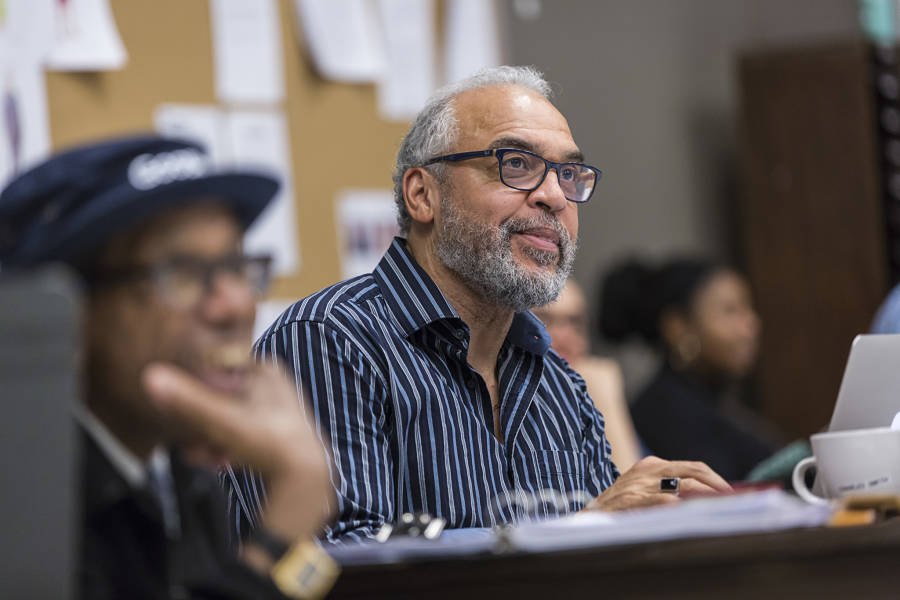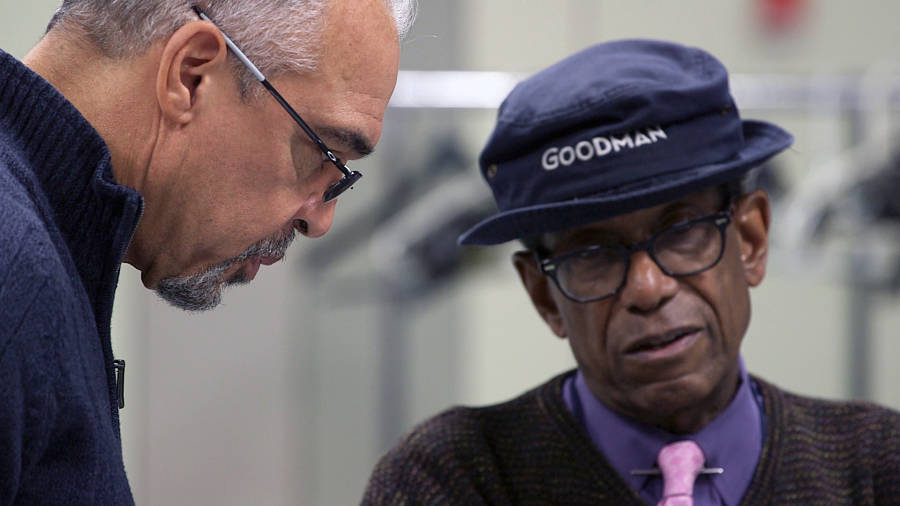Around Chicago theatre it can be necessary to be certain which Smith you’re talking about. Sure, they both grew up on the South Side of Chicago, and they’ve both worked for some time in local theatre at its highest levels, including at the Goodman Theatre, Victory Gardens, and the Court Theatre. But they’re not brothers, let alone the same person. In person there can be no mistaking them, of course, due to their obvious differences in age, height, and coloring. But if you’ve only seen their names in a playbill or a review you may need to be advised that Chuck Smith serves as a resident director at the Goodman, and Charles Smith is a playwright who currently teaches at Ohio University.
Their similar names have appeared on a number of playbills together, in fact, as they’ve worked on multiple productions together, including world premieres of plays by Charles Smith—Knock Me a Kiss (Victory Gardens), Objects in the Mirror (Goodman), and Gospel According to James (Indiana Repertory Theatre)—with Chuck Smith directing. Despite getting confused for each other early in their careers, they both now relish opportunities to work together (and apart) on Chicago and regional stages.
They met while studying at Harold Washington College (formerly Loop College). Charles recalls being in a rehearsal and building sets when he heard everyone buzzing about a “Chuck Smith.”
“I didn’t quite know who he was,” Charles said, “but I knew that everybody in the theatre was impressed by him. So, by extension, I was as well.”
But it wasn’t until a moment at a party that Charles cornered Chuck and a lifelong friendship, and creative partnership, began.
JERALD RAYMOND PIERCE: Did people used to get you two confused?
CHARLES SMITH: You know, yes, they did—the people who didn’t know him. My gripe was, I would go to parties and there were people who didn’t know us and I would introduce myself as Charles Smith and the women would look at me and say, “Oh, you’re Chuck!” And I said, “No, I’m Charles Smith,” and their face dropped. They would take a couple of steps back and say, “Excuse me,” and turn and walk away. I thought, “Oh man, what kind of life is this going to be for me here in Chicago with Chuck Smith?” I was determined to create a name for myself, and I remember telling Chuck, “Man, I’m sick of this. I’m sick of everybody mistaking me for you. One day somebody’s going to mistake you for me.” That was my artistic goal in life.
CHUCK SMITH: It wasn’t too long after that—maybe four, five years later—someone called and asked for one of my plays. I said, “Uh, wait a minute. I think you got the wrong person. My name is Chuck Smith. I think you’re referring to Charles Smith.” So the guy gave me his number and I called Charles and I said, “Hey Charles, guess what happened, man? Somebody called me up and asked for one of my plays, and they had us mixed up.” And then, on the other end of the line I hear: “Yes!”

How has your working relationship has changed over the years?
CHUCK: I don’t think it’s ever been like, we used to do it this way, or we used to feel about this way. I always look forward to it with Charles. If I can work with Charles, I’ll work with Charles.
CHARLES: If anything, I think I’ve learned to trust Chuck’s body language a lot more. He’ll give me a note and he’ll say, “Well, you know. Listen, man. It’s kind of like…” and he’ll flip his hands with the thumb and baby finger going back and forth. And it’s like, I know what that means. Another director would spend 20 minutes talking. I know exactly what Chuck is talking about. That kind of shorthand.
CHUCK: Charles and I are both from the South Side of Chicago, and there’s a kind of a common language of shorthand speech that we spin on the South Side.
Having grown up there, what does it mean to both of you to be able to continually produce work in Chicago and bring world premieres and new work to the city?
CHUCK: Well, for me, that’s part of my own particular mission statement: to develop a theatregoing audience here in the city of Chicago, using as much Chicago talent as possible, whether I do it at the Goodman or whether I’m at one of the other theatres. Building an audience of African American theatregoers from the South Side and on the South Side is not an easy task. It is very, very difficult to put butts in the seats here in Chicago, especially in the South Side.
CHARLES: Yeah, it is difficult, and that’s something I just don’t focus on. I have family on the South Side and there’s suspicion. I could get some of them downtown occasionally to see one of my plays. Some of them are like, “No, I’m not going down there.” So it’s tough to help them get over that suspicion. Then, of course, something happens that justifies that suspicion.

Do you think progress is being made toward getting those people into theatres, or do you think we’re still kind of stuck at this point?
CHUCK: It’s better than what it used to be, that’s for sure. There is, on the South Side now, one of the major city theatres, Court Theatre. They are producing much more African American work now. And there is at least one Black-owned theatre company, eta Creative Arts, on the South Side that produces on a regular basis. Between the two of them, by producing works on a regular scale, that does help develop an audience and keep people coming to the theatre. Good theatre begets good theatre.
When I do shows here at the Goodman, like Objects in a Mirror—people usually don’t have any problem coming to the Goodman. Again, it’s not an easy task, but it’s better than it used to be. Let’s put it that way. Because of the activity over the past 20 years, things are a lot different. There are so many different theatre companies producing African American theatre in the city now. No one is surprised at all anymore. Once upon a time, like about 20, 25 years ago, it was like, “Oh, they got a Black show over there?” It was like that. It was raised eyebrows. But now it’s not unusual at all.
This is theatre. Theatre is always a work in progress in terms of, especially in Chicago, generating a regular audience. Especially for the young people. They all say, “Let’s go to a comedy club, let’s go see a concert, let’s go see a movie.” Every now and then, if a friend of theirs is in a play, they’ll say, “Let’s go see this play that my friend is in.” They’re not going to just say, “Let’s go see this play over at Court Theatre because I wanna see it.” Theatre’s not on their agenda yet.
Charles, is that something that’s consciously on your mind as you’re coming up with new plays? The idea that theatres are having trouble bringing in younger audiences?
CHARLES: Quite frankly, I don’t think about it. Maybe I should, but I don’t. When I get ready to tell a story, I just tell a story. I don’t think about who’s gonna be listening. I just think, I need to tell this story for one reason or another; this is an important story. Usually important for me, and it’s probably important to people like me. So I just look to tell the story and then I’m always surprised at the people who respond to the story.
One of my early plays used a lot of language that at first I was concerned about. I thought, “Oh man, so who’s gonna come see this play?” And actually, it was done in a workshop at the Goodman. One of the first audiences I saw, they were all of these blue-haired old ladies, and I was going, “Oh man. I’m in deep, deep trouble. I’m sure they’re gonna be offended by this. I mean, this guy, he’s using the word ‘motherfucker’ a lot.” Afterward these same women I was concerned about, they were coming up to me and talking about that particular character, just saying, “Oh, I loved him so much!” They responded to that character in a way that I had not expected.
I’ve given up on trying to predict who’s going to come, who’s listening, who’s gonna respond, because every time I try to do that, I’m wrong. So I just focus on telling the story.

production of “Objects in the Mirror.” (Photo by Liz Lauren)
Have there been any plays you’ve worked on where the way you saw the work changed at all?
CHUCK: I think Knock Me a Kiss would probably be a good example. We didn’t change anything, but we did Knock Me a Kiss at Victory Gardens in 2000. After we did it here in Chicago, we thought we had a real winner on our hands because it’s such a wonderful play. But nobody touched it. Nobody seemed to want to do it. I think Oprah bought the TV rights, but she never produced it. About 10 years later, I decided to hook up with New Federal Theater and do it in New York.
I remember at the early preview audiences here in Chicago; it was usually mostly an all-white audience, and they were sitting quietly and attentively, taking every word in and loving, really responding to the play in a quiet fashion. When we went to New York and we did previews in front of pretty much an all-Black house, we found that people were laughing in spots. I had never even thought about laughter much in the play, and there was so much laughter that sometimes you might think that we were doing the play for laughs. I remember looking at Charles, and Charles was looking at me: “So what are they laughing at?” At the end of the show, they’re jumping on their seats. They’re loving it. But it wasn’t like we did anything different. It was just that the response was different from a different audience in a different city.
CHARLES: Yeah, it’s like one audience turns it into a party and another audience, they’re more serious. Jelly Belly was kind of like that as well. I remember Linda Kimbrough coming to see Jelly Belly, and there are a couple of scenes where I was laughing. Some of the other audience is laughing, and Linda nudged me and gave me this dirty look like, “How dare you laugh at this?” I thought, I can laugh—I wrote it.
Jerald Raymond Pierce is a writer based in Chicago.


